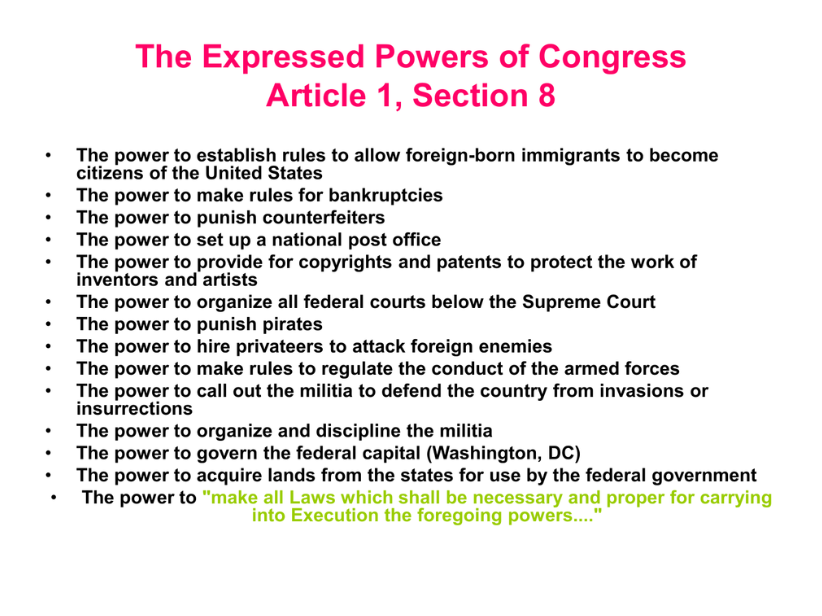Expressed Powers | Definition & Example
Expressed Powers | Definition & Example
Expressed Powers: Superman, as any American knows, can fly. He also has X-ray vision and is really very strong. How do we know these things? They are expressed both verbally (when Superman tells people what he can do) and non-verbally (when he just does them).
Powers that aren’t made clear are hard to deal with, and while that’s problematic with superheroes, it’s real trouble with governments, mostly because the former is fictional, while the latter is all too real.
The Founding Fathers of the United States were as deeply concerned about governmental powers as anyone who’s ever lived because, in their time, they lived through a violent conflict over the nature of power and had witnessed what they saw as the abuses of a tyrant whose powers were largely undefined. So, in writing the Constitution, they were rigorously committed to stating, as clearly as possible, what the government can and can’t do. These are what we call the expressed powers of the U.S. Constitution.

What are the Expressed Powers?
There are three branches in the U.S. government: the legislative branch (Congress, described in Article I), the executive branch(the President, described in Article II), and the judicial branch (the Supreme Court and federal court system, described in Article III). Although each of the branches has their own specific powers and duties, it’s really the Congress that has the most clearly expressed powers, seeing as how the Framers of the Constitution thought that institution was going to be the most powerful.
Today, it definitely is, in a very literal sense. The President really only executes acts of legislation and is heavily constrained by the Constitution. Congress, on the other hand, has enormous and wide-reaching powers, but today, most Americans tend to view the President as the most powerful part of the government. And this makes sense; since there’s only one President, and he sure seems powerful, it’s easy to forget that the Framers assumed the executive would effectively be a sort of governmental middle manager.
In Article I, Section 8, the Constitution lists the expressed powers. They’re sometimes called delegated powers, sometimes called the enumerated powers. They all mean the same things: powers that are actually put down on paper. There is 27 total, but here is a slightly summarized version of the Congress’ expressed powers:
- The Power to tax and spend for the defense and general welfare of the U.S.
- Borrow money
- Regulate commerce with other nations and between the states
- Coin money
- Establish laws of naturalization (how people can become citizens)
- Punish counterfeiters of money and securities
- Establish post offices and roads
- Promote the sciences and the arts through granting patents and copyrights for inventions and discoveries
- ‘Constitute tribunals inferior to the Supreme Court’ (basically, to create a federal court system)
- Define and punish piracies and felonies on the ‘high seas’ (a big issue in the 18th century)
- Declare war
- Raise and support an army/navy
- Make laws governing those armed forces
- Provide for a militia to execute federal laws (and to organize and arm that militia)
- Make the District of Columbia the home of the federal government
- Make any laws necessary for carrying out these powers
Expressed Powers Of Congress
- Article I, Section 8 of Constitution lists 27 expressed powers of Congress
- Include power to declare war, levy taxes, regulate commerce and currency
The 27 expressed powers of Congress listed in Article I, Section 8 of the Constitution grant the legislative branch a huge amount of authority over American national policy, both foreign and domestic.
The most important powers include the power to tax, to borrow money, to regulate commerce and currency, to declare war, and to raise armies and maintain the navy. These powers give Congress the authority to set policy on the most basic matters of war and peace.

Congress’s other expressed powers are wide-ranging, including:
- The power to establish rules to allow foreign-born immigrants to become citizens of the United States
- The power to make rules for bankruptcies
- The power to punish counterfeiters
- The power to set up a national post office
- The power to provide for copyrights and patents to protect the work zone of inventors and artists
- The power to organize all federal courts below the Supreme Court
- The power to punish pirates
- The power to hire pirates to attack foreign enemies
- The power to make rules to regulate the conduct of the armed forces
- The power to call out the militia to defend the country from invasions or insurrections
- The power to organize and discipline the militia
- The power to govern the federal capital (Washington, DC)
- The power to acquire lands from the states for use by the federal government
And, last but definitely not least:
- The power to “make all Laws which shall be necessary and proper for carrying into Execution the foregoing powers….”
Expressed Powers Of The President
The Powers of the President
According to Article II of the Constitution the President has the following powers:
- Serve as commander in chief of the armed forces
- Commission officers of the armed forces
- Grant reprieves and pardons for federal offenses (except impeachment)
- Convene Congress in special sessions
- Receive ambassadors
- Take care that the laws be faithfully executed
- Wield the “executive power”
- Appoint Cabinet officials, White House staff and Supreme Court justices
Powers of the President That Are Shared with the Senate
- Make treaties
- Appoint ambassadors, Cabinet members, and Supreme Court justices
Powers of the President That are Shared with Congress as a Whole
- Approve legislation


